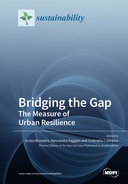Explore

Bridging the Gap
0 Ungluers have
Faved this Work
Login to Fave
The concept of resilience has arisen as a “new way of thinking”, becoming a response to both the causes and effects of ongoing global challenges. As it strongly stresses cities’ transformative potential, resilience’s final purpose is to prevent and manage unforeseen events and improve communities’ environmental and social quality. Although the resilience theory has been investigated in depth, several methodological challenges remain, mainly related to the concept’s practical sphere. As a matter of fact, resilience is commonly criticised for being too ambiguous and empty of meaning. At the same time, turning resilience into practice is not easy to do. This will arguably be one of the most impactful global issues for future research on resilience. The Special Issue “Bridging the Gap: The Measure of Urban Resilience” falls under this heading, and it seeks to synthesise state-of-the-art knowledge of theories and practices on measuring resilience. The Special Issue collected 11 papers that address the following questions: “What are the theoretical perspectives of measuring urban resilience? What are the existing methods for measuring urban resilience? What are the main features that a technique for measuring urban resilience needs to have? What is the role of measuring urban resilience in operationalising cities’ ability to adapt, recover and benefit from shocks?”
This book is included in DOAB.
Why read this book? Have your say.
You must be logged in to comment.
Rights Information
Are you the author or publisher of this work? If so, you can claim it as yours by registering as an Unglue.it rights holder.Downloads
This work has been downloaded 122 times via unglue.it ebook links.
- 122 - pdf (CC BY) at Unglue.it.
Keywords
- adaptive capacity
- buildings energy balance
- Climate adaptation
- Climate Change
- Community Resilience
- Decision making
- Decision-making
- dynamic models
- Economics, finance, business & management
- employment dynamics
- energetic resilience
- fire
- Flood
- geographic information system
- green infrastructure
- indicator
- indicators
- information visualisation
- Knowledge Representation
- land use planning
- mapping
- Measuring
- metro-regions
- Monitoring
- multi-risk
- n/a
- place-based analysis
- public space
- qualitative and mixed models and methods
- Quantitative
- regional resilience
- residential buildings
- resilience
- resilience assessment
- resilience modelling
- scenario planning
- sector composition
- sectoral industry composition
- shift-share analysis
- social-ecological indicators
- Solar radiation
- Spatial planning
- sustainability
- systematic overview
- thema EDItEUR::K Economics, Finance, Business and Management
- urban energy resilience
- urban hourly model
- urban planning
- urban regulation
- Urban Resilience
- urban variables
- urban vs. inner areas
- vulnerability
- walkability
- walkability measure
Links
DOI: 10.3390/books978-3-0365-0767-5Editions

